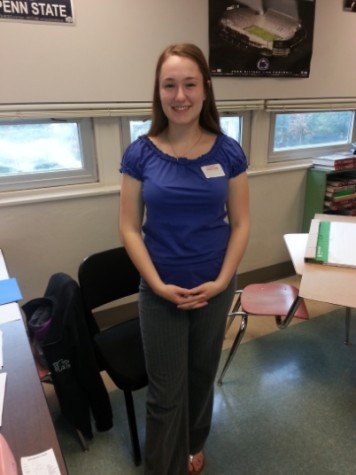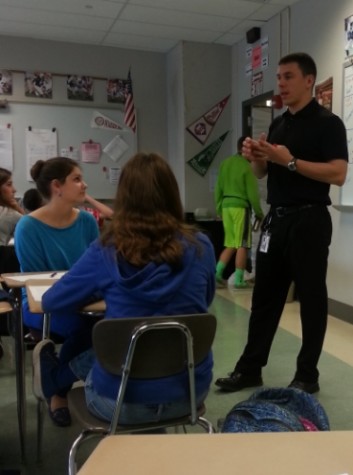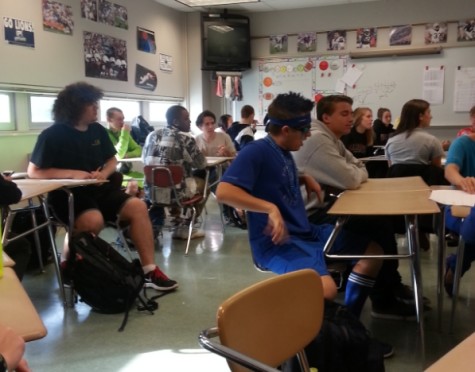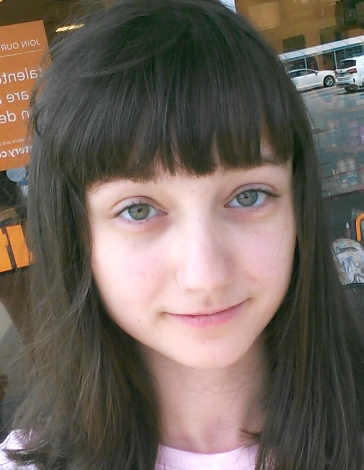Part-Time Student Teacher Arrives at Susky
October 22, 2015

Bethann Hollander poses in JC Lewis’s classroom, her new home for Tuesdays to come.
There’s a new face in the math wing, and she couldn’t be more excited to start her journey in the field of education.
Bethann Hollander, a student at York College enrolled in a program called Secondary Education Mathematics with a minor in special education, was recently assigned a field experience placement with math teacher JC Lewis. She’s currently floating somewhere between a student teacher and an intern, and although Hollander only makes an appearance every Tuesday, Lewis is excited to have a sort of student teacher present in his classroom.
“It’s fun, ‘cause…hopefully, [she’ll] get engaged in…helping the students…it’s always great to have another set of eyes and hands on what you’re doing,” said Lewis.
From the student’s perspective, student teaching might seem like a trivial but necessary part of the machine that makes high schools tick, but Lewis assures that there’s more to it than meets the eye.
“…The experience from ‘behind the desk,’ so to speak, is very different from one as a student, so you get to see…how everything works,” Lewis said. “There’s a lot to think about when you’re becoming a teacher in terms of how you’re gonna run your classroom and what you wanna do, so knowing those things goes a long way.”
Senior Kristen Zak, a student enrolled in Lewis’s AP Calculus BC class, agrees that student teaching is not so simple as one might believe – as a teacher of young violinists herself, she understands what the benefits of student teaching might have been for her.
“I think my perspective has changed on student teachers drastically from one year to another,” said Zak. “I think when I wasn’t a teacher…I took them for granted…and then when I became a teacher myself, [I realized that] these [student] teachers actually do learn a lot from observing us and…watching…what the teacher does, because walking into the first day of my teaching experience was the hardest thing I’ve ever done in my life…I had no background knowledge, no previous experiences with observing other than being the student.”

JC Lewis explains a concept to students in his AP Calculus BC class.
Despite the fact that Hollander has only visited Lewis’s classroom twice so far, she insists that she’s already learned several valuable lessons that she could eventually apply to her own classroom.
“I learned that…it’s really important to question the students, even if it’s just a lecture,” said Hollander. “Mr. Lewis asks them all sorts of questions and, it’s kind of funny, he’ll respond to a question with another question and have the students figure it out, which is really awesome. I also learned that there’s…different ways of teaching. He has one student in one of his classes who is kind of fast-tracking, and I never really saw that happen before.”
Another important aspect of student teaching deals with commitment – if a future teacher never has experience in the classroom, how will they know if they enjoy teaching at all? Hollander recalls that growing up alongside a brother with autism sparked her interest in teaching, especially in special education, but even with this clear goal in mind, her career path wasn’t set in stone.
“I started out teaching in English classes [where] they had me grade papers, and I realized that I was horrible at doing that,” Hollander said. “That kind of scared me…so I switched to math right away…and I actually really, really love helping out in math classes. It’s so much fun when the kids have that ‘Aha!’ moment.”
Lewis, who also tried out another career in college before settling into math education (in his case, architectural engineering), certainly hopes that that moment will arrive for Hollander herself in due course.
“I hope that she starts to have a better idea of what she wants to do in her classroom…and starts to understand what things work for her and what doesn’t work for her,” said Lewis. “…specifically relating to the class that she’s in, with students with disabilities in an inclusive setting…[hopefully she’ll have] an idea of how that works, the behind-the-scenes parts of applying…parts of IEPs…and how that’s gonna relate..to her and affect her as a teacher.”
As Hollander looks towards the future and the possibility of her own classroom, she’s already painting an image of the kind of teacher she wants to be.
“Well, I know that this is kind of weird,” said Hollander. “I’m not excited for grading, but I know that when I do grade, I’m going to try to get back the tests right away because I know that the faster the reinforcement, the better it is for the students…I really want to be engaging, too. I want the kids to get up out of their seats at least once every lesson. I’m kind of excited to make some rules, too. I don’t know what they’ll be yet.”
How to make the rules – it’s just another seemingly simple question she’ll have to answer as she travels down the long road to becoming a teacher.

AP Calculus BC students listen as JC Lewis teaches.



